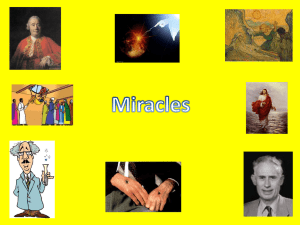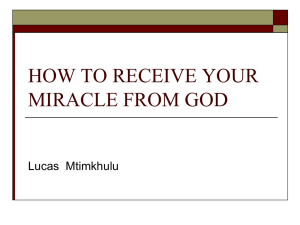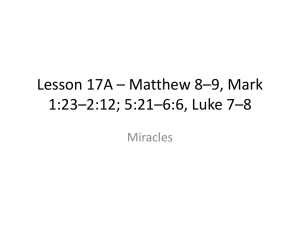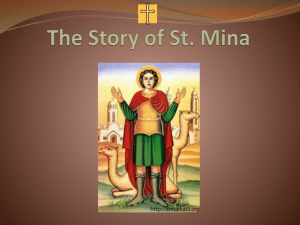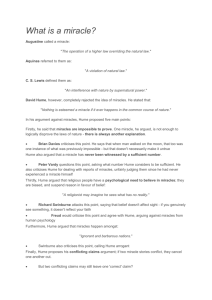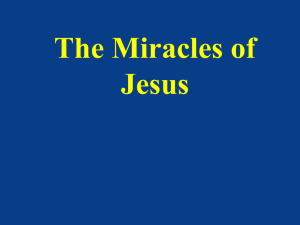Exemplar Script Exercise Phil of Religion 2
advertisement
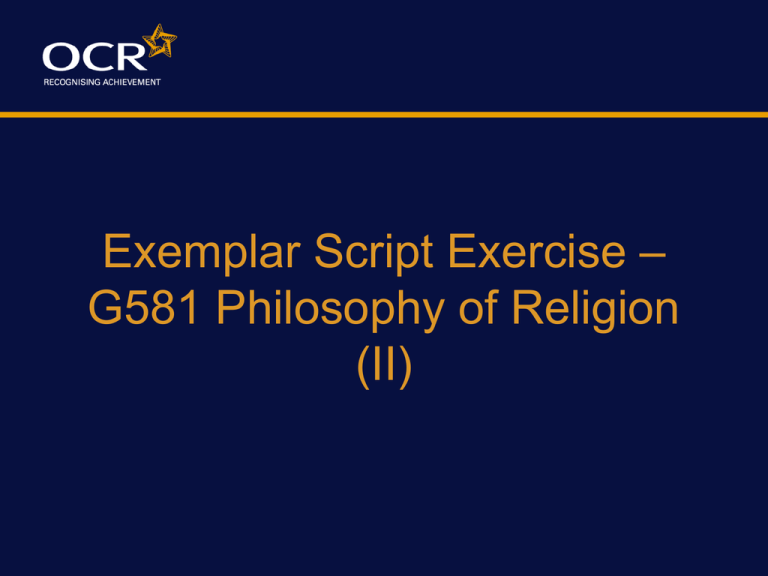
Exemplar Script Exercise – G581 Philosophy of Religion (II) 2) Evaluate the claim that miracles lead to believe in a God who favours some but not all of his creation. [35] There are two definitions of the term ‘miracle’, a violation of natural laws and an event which has religious significance. How you view God may be determined by which definition of God you accept. The idea of a God who favours some but not all his creation is common. It is important not only for miracle but for questions such as predestination. This is not quite as clear a start as the first answer but the examiner is given the impression that the candidate is aware of some of the issues in the question. If miracles are violations of natural laws by the violation of a deity, as Hume and Spinoza thought, questions naturally arise as to why, in some circumstances, God chooses to push the boundaries of natural laws to interfere in his creation. If it is possible for God to act as a parent, as Richard Swinburne suggested, and ease the boundaries of natural laws to interact with humanity, then we must consider the circumstances in which such an immanent God might become involved. This is much better - the response is raising issues which are well focused on the question and using a quality of language often associated with the higher levels of response; which then goes onto develop in a way which demonstrates real engagement with the question. Calvin’s idea of predestination suggests that some people are God’s ‘elect’ and that, after death, these ‘elect’ will join God in heaven. Some believers in predestination suggest that our actions – whether as ‘elect’ or ‘damned’ – are predestined or decided by God. This would mean that we had very little – if any – free will in our decision or actions. This theory of predestination often leads people to believe in a God ‘who favours some but not all of his creation.’ Predestination would be intrinsically linked to miracles in the sense that, regardless of what we do, God has already decided whether he will interact or perform a miracle. Miracles are seen not as short-term breaches of natural law but rather as the eternal intention of God for the world. Religious believers of this type often have a hard time understanding why miracles aren’t common occurrences. However, as Swinburne suggests, if miracles were a frequent occurrence, people would live in confusion, constantly wondering whether laws such as gravity would remain constant. Swinburne also observes that if God were to interact frequently, then humans would take less active roles in society and would, for example, be less likely to find the cure for cancer. Above, there are several signs which point to this being an excellent essay. Firstly, again, the accurate use of technical terms. Secondly the way the candidate uses the thoughts of Calvin and Swinburne in an interactive way – not just writing out what they say but recognising the importance of what they say to the debate at issue and how their thoughts might be developed. It is also worth noting that while I expected candidates to use the writings of Wiles to engage with this question – this is an excellent response where Wiles is not used until the end of the response. In fact this could easily be an excellent response with no mention of Wiles which is why we train examiners to look beyond the mark scheme and assess the work as it is presented. Another possible reason for miracles appearing to be sparse and selective is hinted at in Irenaean theodicy, which suggests that people suffer on earth and in life in order to help them grow and develop. Without suffering or death, life would have little meaning because there would be no real consequences to our actions. By allowing some suffering and by only creating miracles at certain times, God enables us to grow as people to reach an eventual happiness with him. However, thinkers such as D.Z. Phillips resent this idea as it involves the instrumental use of evil and God’s purposeful neglect of suffering. Phillips believes that no amount of happiness in the afterlife justifies pain and harm in this world. Here we have an excellent account of one relevant issue which has been addressed concisely and accurately. Again note the way the response uses philosophical scholars to interact with the issue while being very clear about the consequences of believing the Irenaean Theodicy. In the Old Testament, miracles are used to show God’s power over illness, death and nature, to display his love and goodness and to show his punishment of the wicked and rewarding of the righteous. In Exodus, the story of Moses and the Israelites includes a number of plagues, including the deaths of first-born sons, which God sends on the Egyptian people, but not the Israelites. In this use of punishment it is possible to see God favouring some of his creation but not others. When Moses parts the Red Sea, God is actively involved. When he drowns the Egyptian soldiers, this does not seem consistent with an omnibenevolent God. However, the miracles of the New Testament are different. These focus on the life of Jesus, with around 30 miracle stories. Miracles in the New Testament are often split into two categories, nature miracles and ‘curing’ miracles, whether exorcism or from illness. But interpretation of biblical miracles depends very much on whether they are understood literally or metaphorically. For Rudolf Bultmann, miracles should be viewed as symbols. Through their removal and connected demythologisation of scripture, it is possible to reach the true meaning of these accounts. Bultmann believed that once the supernatural aspects of the New Testament were removed, we would be left with the teachings (kerygma) of Jesus. It is this that the believer should focus on, rather than the miracle stories, which he believed to be later additions. Here we have an excellent account of how miracles can be considered to agree with the sentiment in the question; importantly the response does not feel the need, often found in weaker candidates, to write out the miracle stories themselves but instead uses them to further the evaluation. Then it goes onto to make good use of scholarship relevant to this area. If a believer in miracles were to look at the symbolism behind the miracles, rather than the acts themselves, it would certainly be possible to retain belief in an omnipotent God who does not favour some of his creation, as the miracles would not actually have happened. But some thinkers would strongly dispute this interpretation and suggest that a belief in miracles, especially the resurrection, is essential, otherwise ‘all of our preaching and all of your faith would be in vain.’ (I Corinthians). Again, a concise evaluation of the strengths and weaknesses of Bultmann’s position. The theologian Maurice Wiles disputed miracles on the grounds they were arbitrary and partisan. Wiles believed it would be better to believe in an all-good God who didn’t perform miracles rather than one who chose to ignore those in greatest need. As a supporter of the view that belief in miracles leads to a concept of God who favours some but not others, Wiles commented that ‘even though miracles are rare by nature, it seems strange that nothing prevented Auschwitz or Hiroshima.’ Wiles then uses the example of Jesus turning water into wine to save his host’s embarrassment to assert his belief that some of the miracles in the New Testament appear to be whims of God. With such suffering and pain in the world this seems unjust. Although some theologians argued that Wiles was a deist rather than a theist, his point remains valid and can be used to support the view of God’s favouritism. A good use of the Deist critique while still recognising the validly of the point Wiles is trying to make. If a believer in miracles were to adopt the definition of a miracle as an event which holds religious significance, then it is possible to argue against the notion that a belief in miracles suggests a God who favours some but not all his creation. For someone who perceives miracles to be events which have religious significance, it is possible to argue that God plays no direct role in the event but it is the experiencer’s faith which leads him to believe that it was caused by God. R.F. Holland used the analogy of a boy playing on train tracks to explain this point. A boy was playing on the tracks and a train was coming round a bend, unable to stop. The train’s driver had collapsed, releasing the dead man’s handle. The boy’s mother perceived this to be a miracle, although the events were the consequence of natural events. God may have had nothing to do with the boy’s survival, shown no favouritism or decided to save the boy while the driver suffered. If a believer in miracles held this view, believing that in some cases it is all a matter of how an experiencer interprets the miracle, then a belief in an omnibenevolent and fair God would still be possible. The criticisms by Maurice Wiles, as well as theories of predestination, show how it is possible to think of a God who has favourites, but things can be understood differently. It is a matter of interpretation. A symbolic interpretation, such as that of Wiles, can lead to the concept of a God who advocates peace and true equality. This is of those responses where I would say at a standardisation meeting what more would you want in 45 minutes to give a candidate full marks? I am not suggesting that others things could have been said, only that in 45 minutes this has to be considered a very full answer demonstrating a sound understanding of relevant scholarship and engaging fully with the question.


